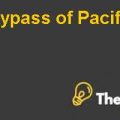
Problem or Issue Identification
Dealing with the non-performing loans has been a major problem in the country which has slowed down the economic recovery of the country. Since the burst of the bubble that had developed in the 1990’s, many companies including Olympus had invested in banks and other financial institutions by observing the boom in the financial industry. However, since the burst of the bubble many companies were on the verge of bankruptcy but did not want to share the particular information with public. Therefore, Olympus along with other companies had not shown losses in the balance sheets. This approach proved the corruptive culture in different organizations which had led to the negative publicity of Japanese culture and also prevented foreign companies to enter the Japanese stage. This particular problem also gave birth to another problem in which the investment companies of Japan have been found reluctant to provide loans to the industrial companies due to the poor financial position or the term referred to as forbearance lending. This has allowed a stoppage in the long term growth of the country and its future prospects.
The second most important issue is the transparency amongst the top management and the business owners of the company. It has long been embedded in the Japanese culture to hide valid information from the public and other authorities as it would hurt their credibility. This culture has promoted lack of trust amongst different organization. While considering the information on the nuclear plant of Japan which had been damaged, the responsible authorities did not reveal the exact information about the intensity of the damage until the damage had been done. This particular behavior has led the company to a decrease in the FDI as companies are reluctant to represent their culture in the country which they fear might be opposed by the country.
Furthermore, corporate capitalism has been developed within the organization which is referred to a state in which employees and management comply with their own goals without taking interest in increasing shareholder’s wealth. However, this particular situation was never the same until after the economic downturn in 1990. Many aspects of the organizational culture and the governance of the country have been taken from the western world after economic downturn era which has greatly affected the ideology of the country. Previously, the employees were dedicated to their employer and would consider calling their company ‘Uchi’ which refers to ‘their own house’. This has also allowed the corruption to prevail as employees are concerned with their own tasks and responsibilities.
Moreover, the Japanese culture promoted the acknowledgment of failure and resisting change which has created many problems for the company. A Japanese individual would rarely acknowledge their mistake and failure and would not commit to make changes and would utilize a conservative approach. Since there have been many changes in the trends amongst corporations and other activities around the world, the top management of the big companies in Japan have resisted to change which has increased twice the fold of huge damages to the economy and the future of Japan. This particular uncertainty has restrained foreign companies to invest more on building Japan.
Alternatives and Evaluation
Maximizing Shareholder’s Value
The dominant corporate goal for companies shall rest upon maximizing the shareholder’s wealth through legal means and legal channels. This strategy implementation is imperative to revive the old culture of Japan where employees were retained for a lifetime because they were loyal and committed to the organization and embraced organization’s values. The ‘Uchi’ goal shall be revived in which every employee considers the working organization as their own organization. This may also develop honest and fair working amongst individuals and groups, and it would also embrace the culture of whistle-blowing in which employees would refer to the concerned authorities and regulators if the company is involved in illegal activities. However, this particular alternative also poses disadvantages as the idea could also be developed to acquire revenues without considering communities and other stakeholders. If the particular idea is to embed in a company then it would take a longer period of time to change the culture as the top management opposes the change.
Accountability
a transparent accountability system shall be established through the formulation of an investigative organization which shall be responsible for screening the business practices performed by the various companies and shall manage to scrutinize their secretive dealings with other institutions. The advantages of the particular model would include lowering the corruption and fraud amongst the business culture and shall promote the culture of working hard with integrity and honesty. However, many organizations have been established previously with similar roles but none of them had fully controlled poor corporate governance that has resulted in reduced FDI...........................................
This is just a sample partial case solution. Please place the order on the website to order your own originally done case solution.












